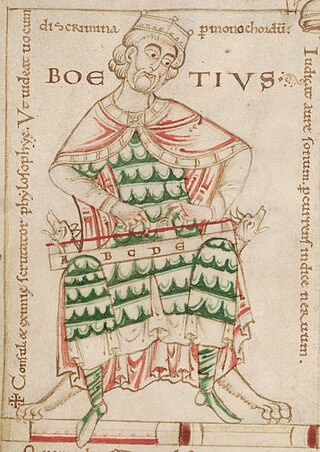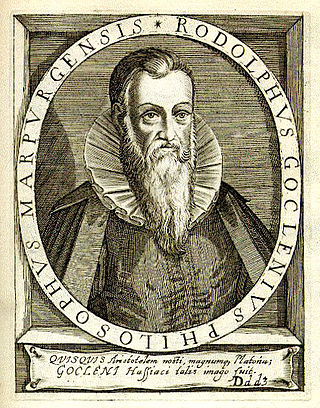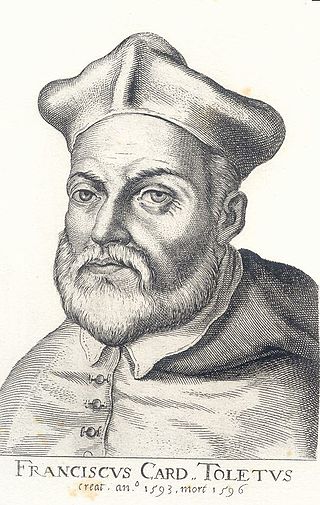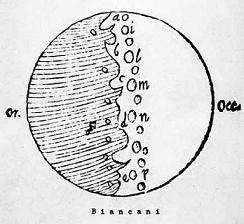The history of logic deals with the study of the development of the science of valid inference (logic). Formal logics developed in ancient times in India, China, and Greece. Greek methods, particularly Aristotelian logic as found in the Organon, found wide application and acceptance in Western science and mathematics for millennia. The Stoics, especially Chrysippus, began the development of predicate logic.

Jean Buridan was an influential 14th‑century French philosopher.

Anicius Manlius Severinus Boethius, commonly known simply as Boethius, was a Roman senator, consul, magister officiorum, polymath, historian, and philosopher of the Early Middle Ages. He was a central figure in the translation of the Greek classics into Latin, a precursor to the Scholastic movement, and, along with Cassiodorus, one of the two leading Christian scholars of the 6th century. The local cult of Boethius in the Diocese of Pavia was sanctioned by the Sacred Congregation of Rites in 1883, confirming the diocese's custom of honouring him on the 23 October.

Aristotelianism is a philosophical tradition inspired by the work of Aristotle, usually characterized by deductive logic and an analytic inductive method in the study of natural philosophy and metaphysics. It covers the treatment of the social sciences under a system of natural law. It answers why-questions by a scheme of four causes, including purpose or teleology, and emphasizes virtue ethics. Aristotle and his school wrote tractates on physics, biology, metaphysics, logic, ethics, aesthetics, poetry, theatre, music, rhetoric, psychology, linguistics, economics, politics, and government. Any school of thought that takes one of Aristotle's distinctive positions as its starting point can be considered "Aristotelian" in the widest sense. This means that different Aristotelian theories may not have much in common as far as their actual content is concerned besides their shared reference to Aristotle.

The Organon is the standard collection of Aristotle's six works on logical analysis and dialectic. The name Organon was given by Aristotle's followers, the Peripatetics, who maintained against the Stoics that Logic was "an instrument" of Philosophy.

The Nicomachean Ethics is among Aristotle's best-known works on ethics: the science of the good for human life, that which is the goal or end at which all our actions aim. It consists of ten sections, referred to as books, and is closely related to Aristotle's Eudemian Ethics. The work is essential for the interpretation of Aristotelian ethics.

The designation "Renaissance philosophy" is used by historians of philosophy to refer to the thought of the period running in Europe roughly between 1400 and 1600. It therefore overlaps both with late medieval philosophy, which in the fourteenth and fifteenth centuries was influenced by notable figures such as Albert the Great, Thomas Aquinas, William of Ockham, and Marsilius of Padua, and early modern philosophy, which conventionally starts with René Descartes and his publication of the Discourse on Method in 1637.
The Conimbricenses are an important collection of Jesuit commentaries on Aristotle compiled at University of Coimbra in Coimbra, Portugal.

Rudolph Goclenius the Elder was a German scholastic philosopher. Gockel is often credited with coining the term psychology in 1590, though the term had been used by Marko Marulić at least 66 years earlier. Gockel had extensive backing, and made significant contributions to the field of ontology. He extended the development of many ideas from Aristotle. Several of Gockel's ideas were published and built upon by later philosophers.

The works of Aristotle, sometimes referred to by modern scholars with the Latin phrase Corpus Aristotelicum, is the collection of Aristotle's works that have survived from antiquity.

The Physics is a named text, written in ancient Greek, collated from a collection of surviving manuscripts known as the Corpus Aristotelicum, attributed to the 4th-century BC philosopher Aristotle.
Early Islamic law placed importance on formulating standards of argument, which gave rise to a "novel approach to logic" in Kalam . However, with the rise of the Mu'tazili philosophers, who highly valued Aristotle's Organon, this approach was displaced by the older ideas from Hellenistic philosophy. The works of al-Farabi, Avicenna, al-Ghazali and other Muslim logicians who often criticized and corrected Aristotelian logic and introduced their own forms of logic, also played a central role in the subsequent development of European logic during the Renaissance.

GiacomoZabarella was an Italian Aristotelian philosopher and logician.

Francisco de Toledo was a Spanish Jesuit priest and theologian, Biblical exegete and professor at the Roman College. He is the first Jesuit to have been made a cardinal.
Aristotle first used the term ethics to name a field of study developed by his predecessors Socrates and Plato which is devoted to the attempt to provide a rational response to the question of how humans should best live. Aristotle regarded ethics and politics as two related but separate fields of study, since ethics examines the good of the individual, while politics examines the good of the city-state, which he considered to be the best type of community.

Giuseppe Biancani, SJ was an Italian Jesuit astronomer, mathematician, and selenographer, after whom the crater Blancanus on the Moon is named. Biancani was one of the most able and respected Catholic astronomers of his day, and his main work, Sphaera Mundi, was republished at least four times in the seventeenth century, 1620, 1630, 1635, and 1653.

Walter Burley was an English scholastic philosopher and logician with at least 50 works attributed to him. He studied under Thomas Wilton and received his Master of Arts degree in 1301, and was a fellow of Merton College, Oxford until about 1310. He then spent sixteen years in Paris, becoming a fellow of the Sorbonne by 1324, before spending 17 years as a clerical courtier in England and Avignon. Burley disagreed with William of Ockham on a number of points concerning logic and natural philosophy. He was known as the Doctor Planus and Perspicuus.
In medieval philosophy, the active intellect is the formal (morphe) aspect of the intellect (nous), according to the Aristotelian theory of hylomorphism. The nature of the active intellect was a major theme of late classical and medieval philosophy. Various thinkers sought to reconcile their commitment to Aristotle's account of the body and soul to their own theological commitments. At stake in particular was in what way Aristotle's account of an incorporeal soul might contribute to understanding of deity and creation.
Amicus Plato, sed magis amica veritas is a Latin phrase, translating to "Plato is my friend, but truth is a better friend ." The maxim is often attributed to Aristotle, as a paraphrase of the Nicomachean Ethics 1096a11–15.

Thomas Compton Carleton was an English Jesuit and scholastic philosopher, chiefly remembered for his contributions to natural philosophy and the philosophy of language.













